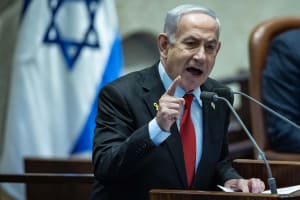As details of Qatar operation leak, Israeli officials worry that Hamas leaders escaped moments before the strike
Qatari PM rebuts claim by Trump that US notified Doha before Israeli strikes, says call came after

On Tuesday, Prime Minister Benjamin Netanyahu approved a daring strike on Hamas leaders in Doha, Qatar, upending the assumption of many that Israel would not dare to strike at the U.S. government’s other Middle East partner.
The Israeli strike on Hamas leaders in Doha targeted a meeting for which several leaders of the terror organization living abroad had come to Qatar, ostensibly to discuss the latest U.S. proposal. The exact nature of the meeting is not clear, as Hamas had also publicly rejected the latest offer by the administration of President Donald Trump, calling it a “humiliating surrender document.”
While Israeli officials, including Prime Minister Netanyahu, had previously promised to track down and kill every Hamas member involved in the Oct. 7, 2023, attacks, it was widely believed that Israel would not strike them in Qatar due to the U.S. strategic relationship with Qatar and the presence of a U.S. military base there.
However, following the terror attack in Jerusalem which killed 6 Israelis on Monday, and the hard line presented by Hamas, Netanyahu reportedly authorized the attack only a few hours before it was carried out.
Now, the Wall Street Journal has released details about the strike, reporting that over 10 IAF fighter jets were involved in the strike. The Israeli jets were reported not to have entered Qatari airspace, utilizing a form of “over the horizon” stand-off munitions which were launched hundreds of kilometers away from the target.
Amir Avivi, a former senior military official close to the Israeli government, told the WSJ, “You can shoot from pretty far away. You don’t need to be above Qatar to do it.”
While the jets were en route, Israeli officials notified their U.S. counterparts of an upcoming strike, without providing the exact target details.
U.S. military tracked the launch of the missiles, and inferred the target based on trajectory. U.S. CENTCOM notified the White House, at which point President Trump reportedly instructed special envoy Steve Witkoff to notify Qatar.
However, Qatari Prime Minister Mohammed bin Abdulrahman Al Thani contradicted Trump’s claim that the U.S. gave a warning before the strike, saying the U.S phone call came 10 minutes after the first explosion.
BREAKING: Qatar Prime Minister Mohammed bin Abdulrahman bin Jassim Al Thani says the US warned them about the attack 10 minutes after it began, despite the White House saying they gave Qatar advanced notice of the attack.https://t.co/xjHHStaJLi
— Sky News (@SkyNews) September 9, 2025
📺 Sky 501, Virgin 602 pic.twitter.com/fMet6oWCPE
Unlike strikes in Syria, in which Israel often chooses not to comment, Prime Minister Netanyahu publicly announced the strikes very shortly after they occurred, while claiming that Israel was solely responsible for the operation.
Unusually, Trump later commented on social media that Israel had not notified him in advance of the strikes, saying the notification came only once the jets were already en route and approaching their launch point. He later told reporters in Washington that he was “not thrilled” about the strike.
“I’m just, I’m not thrilled about the whole situation,” Trump told the reporters. “We want the hostages back, but we are not thrilled about the way that went down today.”
At the time of publication, the results of the strike were not clear. Hamas released a statement claiming that the targeted officials were not killed, and that only lower-level officials and a couple of family members of Hamas official Khalil al-Hayya were killed in the strike.
An Israeli official told Army Radio correspondent Doron Kadosh that the lack of confirmation is “disturbing.”
“We still have no indications,” the source stated. “Yesterday, there was optimism and it was replaced by uncertainty. The fact that so many hours have passed without a clear conclusion is disturbing, certainly in a country as organized as Qatar.”
Channel 12 News reported that the IDF has been conducting bomb damage assessment (BDA) by analyzing photos and video of the strikes, including those posted on traditional and social media. In the past, Hamas has published statements denying the efficacy of targeted strikes, only to admit weeks or months later that the person being targeted was, in fact, killed.
This happened with Mohammed Deif, earlier in the war, as well as with Mohammed Sinwar, the brother of former Hamas leader Yahya Sinwar.
Qatari newspaper Al-Araby Al-Jadeed (The New Arab) reported that the Israeli strike came just minutes after the meeting ended, and that most of the Hamas leaders had already departed by the time the missiles struck.
At the same time, reports in a couple of Hebrew news outlets said that some senior Israeli officials are concerned that information about the strike may have been leaked by a U.S. official ahead of the strike, allowing the Hamas leaders to escape in the moments before the strike.

The All Israel News Staff is a team of journalists in Israel.
You might also like to read this:

















